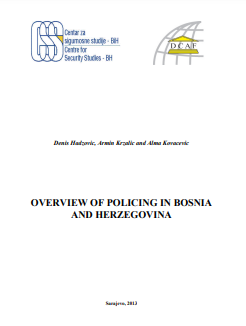Overview of Policing in Bosnia and Herzegovina
Overview of Policing in Bosnia and Herzegovina
Author(s): Denis Hadžović, Armin Kržalić, Alma Kovačević
Subject(s): Governance, Government/Political systems, Security and defense
Published by: Centar za Sigurnosne Studije
Keywords: BIH; security; police; policing; overview;
Summary/Abstract: The results of this research are based upon the analysis of adequate laws and regulations prescribing the work of the Ministries of Interior and police organizations, the information on the budget resources obtained from official sources of the government institutions, and the interviews with the officials from the Ministries of Interior, Brcko District Police of BiH and other police organization in BiH. Over the working period we faced certain limitations, mostly related to the inaccessibility of the public to the legislative regulations, particularly those of Cantonal police organizations; this is why this research was partially limited to the work of those organizations which either make their legal regulations and bylaws accessible to the public, or which provided them to us at our request. This research project on police reform in BiH represents our modest contributions to the aspirations for embracing the highest democratic principles in this area of the state government. This research is comprised of five chapters: historical overview of police system reform in BiH; organizations, numbers and competencies; financing of the police system in BiH; structural analysis of jurisdictions in legislation and in practice; internal and international cooperation and final conclusions.
Series: Centar za Sigurnosne Studije - MISCELLANEOUS PAPERS
- Print-ISBN-13: 978-9958-857-04-1
- Page Count: 94
- Publication Year: 2013
- Language: English
- eBook-PDF
- Table of Content
- Introduction

